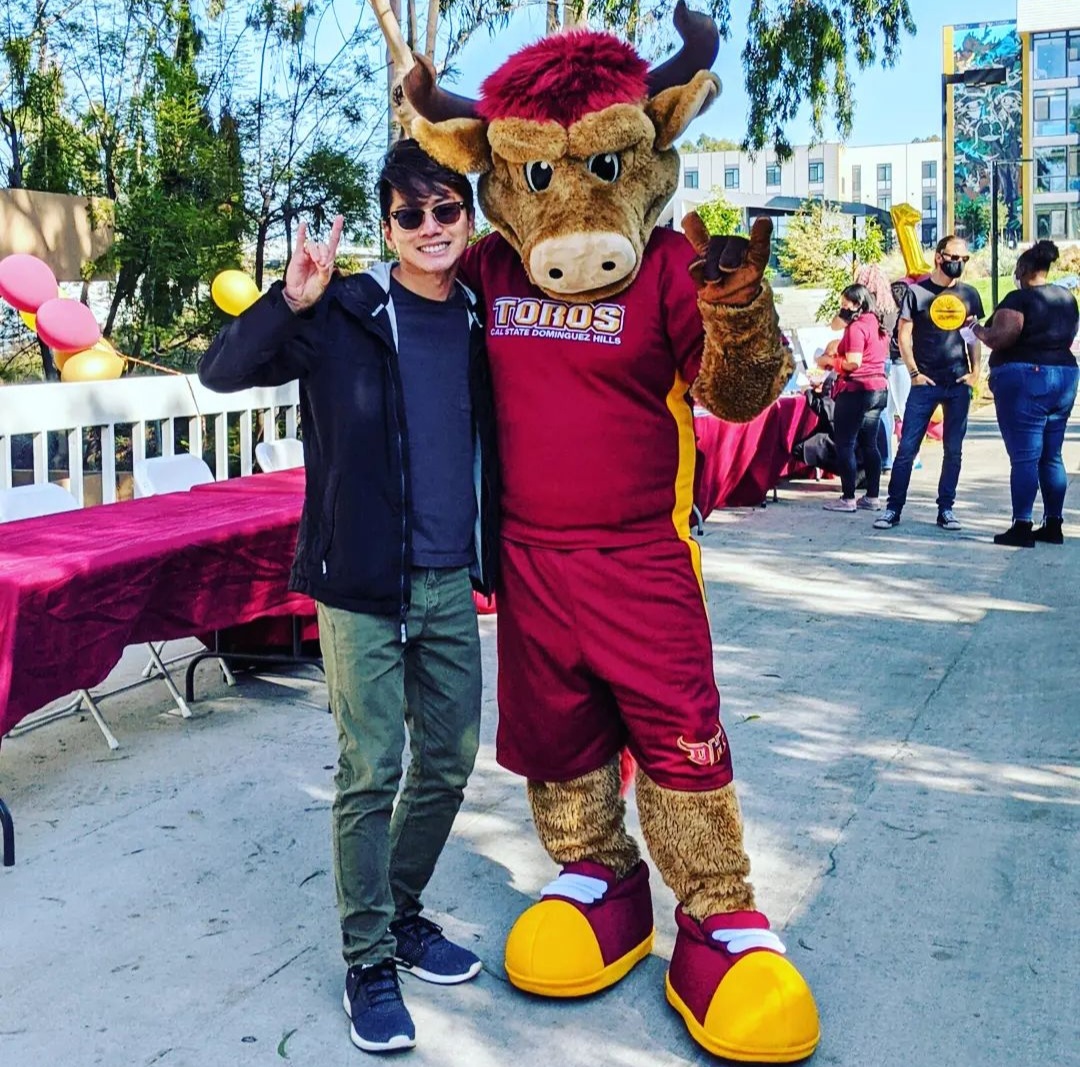Nate Nguyen, the APCC’s new Program Director, is welcomed by Teddy the Toro, as he begins work on the new resource center. Photo courtesy of APCC.
By Mycah Serdenia, Staff Reporter
California State University, Dominguez Hills will soon be home to a new resource center that aims to foster academic and personal success for Asian Pacific Islander (API) students on campus. The center which had been planned to be fully developed earlier this year was delayed due to the pandemic, but now talks have once again resumed with the center hoping to open by the end of the spring semester.
Along with the development of the APCC, Nate Nguyen, who was hired last October, is the center’s new program director.
The coming of this resource center comes at a time where API student enrollment at CSUDH has dropped quite significantly over the past year.
According to the CSUDH Student Profile, the Asian student body in the spring of 2021 dropped from 11% to 6% going into the fall. Nate feels a reason for this is how disconnected API students are to the university. As a result, they are at a higher risk of dropping out and falling short on their goals.
“Having this space for API students will help them feel welcome and create a sense of belonging,” Nate explained. “A physical location where we can convene will allow for API needs to be heard and push for more visibility here at CSUDH,” he added.
Before taking on the program director position, Nate was a coordinator at California State University, Fullerton as part of their Diversity Initiatives and Resource Centers. He developed and conducted workshops for students in classrooms and student organizations around topics of: identity development, intersectionality, and intercultural communication. Nate helped develop and supported the many cultural centers at CSUF.
“From what I understand, CSUDH previously had a centralized office that supported different student populations and that was the multicultural center,” he said. “Slowly, plans were made to host identity specific resource centers and moved away from the multicultural center model.”
Nate mentions centers like the Latinx Cultural Resource Center, which opened last year, was an example of the campus’s plan to move away from having a centralized center. Student advocacy also played a major role is picking up the pace in developing more resource centers like the LCRC and Queer Culture & Resource Center.
Although there is currently no physical space assigned for the APCC, Nate has met with the university administrators and is currently working to locate and secure a space for the API community. According to Nate, there are many factors that play into finding the right spot for the center, two of them being visibility and accessibility. Securing a location that is visible to the CSUDH community will allow its presence to be known and much more accessible compared to it being hidden from plain view.
Upon his hiring, Nate was aware he would be tasked in developing the groundwork and implementation of the brand new center.
“I knew that accepting this position would be a challenge,” he said. “But I’m inspired and motivated by every interaction I have had with API students and I look forward to having the space for our API community soon,” he added.
With 10 years of experience working in higher education and a passion for creating opportunities for underrepresented students, Nate is thrilled to work with our API community to build the future home of the Asian & Pacific Cultural Center here at CSUDH.
“Advocating for API students who feel culturally lost will be the main focus for me going forward once the center itself has been established,” Nate ensured.
For now, the APCC began its events and programming without physical space and plans to continue to collaborate and engage with clubs and organizations on campus virtually and in-person.
The APCC will help foster a broader campus strategy to ensure that API students have the best chance to succeed. Highlighting and celebrating API cultures will create a sense of visibility on campus, helping API students feel seen and heard by those around them. The center will also commit to learning about their histories and tackle current issues affecting the API community locally and nationally. As stated in the organization’s Torolink, “We are dedicated to developing student leaders with a strong sense of social justice grounded in intersectionality and anti-racism, collaboration, and commitment to equity and inclusion.”
With much anticipation surrounding the development of the APCC, API students are eager for the center to be built and look forward to opportunities the center will provide. Jamie Saturno, a Health Science major and board member for the Filipino club at CSUDH, says she feels proud to know there will be a place for us to be represented and recognizes our presence on campus.
“As a Filipino student, this will definitely be my new go-to center once it opens,” she says.
As developments and programs become much more accessible to the API student body on campus, their presence is attracting much more attention academically and physically. Programs such as the Asian-Pacific Studies program being approved as a major in the fall of 2020 and now the growth of the APCC, the API community of CSUDH has much to look forward to in the near future.
To learn more about the APCC and to stay up to date with events, follow them on Instagram @csudh.apcc, or email them at [email protected].

